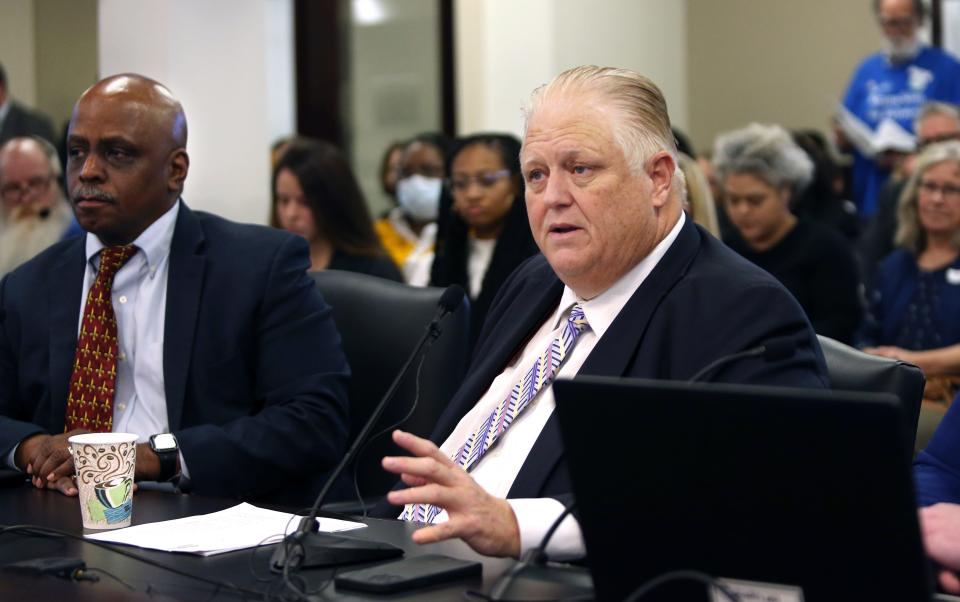Juvenile justice bill to reopen Louisville detention center clears House committee
- Oops!Something went wrong.Please try again later.
- Oops!Something went wrong.Please try again later.
FRANKFORT, Ky. — A high-profile bill to fund a new state detention facility in Louisville for juvenile offenders and implement new rules for kids charged with violent crimes cleared a House committee Wednesday — and now appears to have a clear path to passage into law this session.

House Bill 3, sponsored by Rep. Kevin Bratcher, R-Louisville, is a reaction to both increased violent crimes committed by youths in Louisville and a year full of incidents of violence and riots at youth detention facilities operated by the Kentucky Department of Juvenile Justice.
Bratcher's bill would appropriate $8.9 million to retrofit and reopen a juvenile detention center in Louisville that was operated by the city until 2019, when it closed due to city budget cuts, and now would be operated by the state.
Many detained Louisville youths are now held far away at the state facility in Adair County, which further disconnects them from family and certain services.
More:Tax cuts, school choice and TikTok: Here's what's moving in Kentucky's legislature
Louisville Deputy Mayor David James — who served as president of Louisville Metro Council before being tapped to join new Mayor Craig Greenberg's administration — told legislators in the House Judiciary committee Wednesday the city supports the state reopening and operating the facility.
Rep. Jason Nemes, R-Louisville, praised Greenberg for welcoming the reopening, saying it would address the problems unique to youth offenders in Louisville (such as gangs), and prevent them from being shipped across the state.
"Unfortunately, in Louisville, we've got to send our kids to Adair County, in a facility with staff that don't understand our kids, and they're not ready for our kids," Nemes said. "We need them home."
Besides reopening the Jefferson facility, HB 3 would change how charged juveniles are processed, including:
A maximum 48-hour hold on youths charged with serious violent crimes, or until they have appeared before a judge in a detention hearing.
Parents of a charged juvenile would be forced to appear before a judge if they are found to not be cooperating with their child's diversion program, with possible criminal penalties.
If a juvenile is convicted or admits to a serious violent crime, their criminal record would be open for five years, and only closed again if the person has not been convicted of any additional public offense in that time.
The ACLU of Kentucky is particularly opposed to the provisions on mandatory holds and opening youth records, with Kentucky's deputy public advocate Scott West telling legislators "it's never going to help a truant child if their parents are in jail."
Rep. Keturah Herron, D-Louisville, who was previously a court-designated worker for detained youths in the city's system, was the lone no vote on HB 3 on the committee.
Herron said Kentucky's Department of Juvenile Justice and and Metro Department of Corrections are already short-staffed and questioned if there would be enough money and workers for the state to adequately operate the new facility properly.
Bratcher said another bill will be filed in the Senate to address those issues but gave no further details.
More:LIST: Here's the latest on key bills from the 2023 Kentucky legislature
Herron said much more needs to be done than just "spending $8.9 million on an old building."
"I know that we need to bring our young people home," Herron said. "However, I also know that we need intervention, prevention, alternatives to detention, and we also need a day reporting center. So I believe that even if we invested more funds, that we may be able to have a different type of solution."
A bill that would have implemented similar reforms to HB 3 passed the House in the 2022 session, but it died in the Senate after facing criticism from Sen. Whitney Westerfield, the Republican chairman of that chamber’s judiciary committee.
Westerfield expressed his strong disagreement with the bill to colleagues last March, saying it would roll back landmark juvenile justice reforms passed in 2014 to limit incarceration and improve services for youths who commit less serious offenses.
Westerfield told The Courier Journal on Tuesday that he would now vote for HB 3, though he had reservations about it still containing provisions on mandatory holds and opening up the records of juveniles.
"I wish that we didn't have to have mandatory detentions," Westerfield said. "The opening of the records for those juveniles, I have concerns about that being a weight around the necks of some of those kids."
More:'Profoundly disagree': Sen. Whitney Westerfield urges 'no' vote on juvenile justice bill
Westerfield said he hopes the bill is amended to drop the opening of records but expects the mandatory holds to remain.
Bratcher indicated in committee that he is open to narrowing the scope the records that would be open to the public.
Testifying before another legislative committee Tuesday, John Hicks — the state budget director and executive cabinet secretary for Gov. Andy Beshear — said the funding for a reopened Louisville youth detention center would be needed sooner than prescribed in HB 3.
Hicks added that the total estimated costs for needed staffing, operations and capital improvements at the Department of Juvenile Justice detention facilities statewide is roughly $76 million.
Reach reporter Joe Sonka at jsonka@courierjournal.com and follow him on Twitter at @joesonka.
This article originally appeared on Louisville Courier Journal: Bill to reopen Louisville youth detention center advances in House

